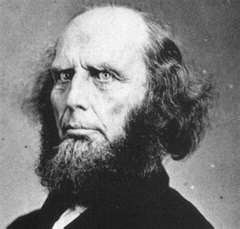A man Christianity would be better off without
Here's a disturbing- and eye-opening- look by Reformed author and theologian Dr. Michael Horton at the man who is at once one of the primary influences on American "Evangelicalism," and one of the greatest heretics in the history of the Christian Church: Charles Finney (right).
And yes- he's just as frightening as he looks.
Finney's theology contradicted that of St. Paul at nearly every critical point. The arch-prophet of salvation by works alone, Finney went beyond medieval Catholicism and virtually everybody since Pelagius in making human agency and merit the only real factor in salvation. He said that the only sins Christ could have paid for on the cross would have been His own!
Denying the Holy Spirit any real role in either conversion or sanctification, not only did Finney deny original sin and teach that salvation requires absolute moral perfection, but his emphasis on salesmanship, marketing, and other human techniques as methods of "evangelism" directly paved the way for the Church Growth Movement and many of the other shallow and unbiblical abberations of the contemporary American religious scene. Sadly, many "evangelicals" consider him a hero, not realizing the quantity or magnitude of his errors.
Finney was the inventer of altar calls, revival meetings, and the other historical innovations which marked the hysterical but spiritually shallow late Eighteenth Century movement ironically called the Second Great Awakening. In reality, the movement didn't deserve to be mentioned in the same breath as the original and authentic Great Awakening of the 1730's and '40's. That first "awakening" featured preachers such as Jonathan Edwards and George Whitefield, and was focused on God- and especially on Jesus Christ. The second focused on the human being, and his or her human striving. The First Great Awakening deepened the human encounter with God; the Second trivialized it and led to the birth of numerous new denominations more centered in human ideas and emotions than on God's grace.
Perhaps Charles Finney isn't to blame for all of the problems contemporary Protestantism faces. But you'll find his unbiblical and sub-Christian theology at the bottom of a goodly percentage of them. American Christians need to know this heretic better- and to steer clear of his continuing and baleful influence.
And yes- he's just as frightening as he looks.
Finney's theology contradicted that of St. Paul at nearly every critical point. The arch-prophet of salvation by works alone, Finney went beyond medieval Catholicism and virtually everybody since Pelagius in making human agency and merit the only real factor in salvation. He said that the only sins Christ could have paid for on the cross would have been His own!
Denying the Holy Spirit any real role in either conversion or sanctification, not only did Finney deny original sin and teach that salvation requires absolute moral perfection, but his emphasis on salesmanship, marketing, and other human techniques as methods of "evangelism" directly paved the way for the Church Growth Movement and many of the other shallow and unbiblical abberations of the contemporary American religious scene. Sadly, many "evangelicals" consider him a hero, not realizing the quantity or magnitude of his errors.
Finney was the inventer of altar calls, revival meetings, and the other historical innovations which marked the hysterical but spiritually shallow late Eighteenth Century movement ironically called the Second Great Awakening. In reality, the movement didn't deserve to be mentioned in the same breath as the original and authentic Great Awakening of the 1730's and '40's. That first "awakening" featured preachers such as Jonathan Edwards and George Whitefield, and was focused on God- and especially on Jesus Christ. The second focused on the human being, and his or her human striving. The First Great Awakening deepened the human encounter with God; the Second trivialized it and led to the birth of numerous new denominations more centered in human ideas and emotions than on God's grace.
Perhaps Charles Finney isn't to blame for all of the problems contemporary Protestantism faces. But you'll find his unbiblical and sub-Christian theology at the bottom of a goodly percentage of them. American Christians need to know this heretic better- and to steer clear of his continuing and baleful influence.



Comments